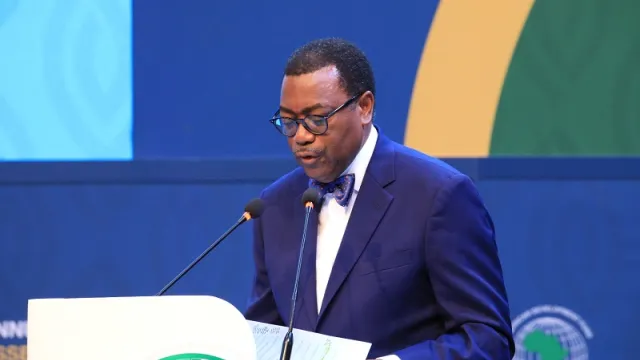AfDB rolls out ambitious 10-year plan to transform Africa

AfDB rolls out ambitious 10-year plan to transform Africa
In a plan that is organized to address Africa's challenges and help spur sustainable growth, the African Development Bank Group (AfDB) has launched its 10-year strategy set to run from 2024 to 2033.
Central to the 2014-2033 strategy is the belief in Africa's potential for societal and economic transformation. The strategy cites Africa's young and rapidly growing workforce, burgeoning urban markets, rich natural resources, and vast clean energy potential as key drivers for sustainable growth.
“The Ten-Year Strategy outlines how the Bank will invest in Africa’s best asset: its vibrant young men and women. Africa’s population, which is the fastest-growing in the world, presents the continent with an unparalleled demographic window of opportunity,” AfDB President Dr. Akinwumi Adesina said.
The strategy, which was unveiled during the lender's annual meetings in Nairobi, is designed to steer the continent toward sustained economic growth.
It outlines two primary objectives for the next decade: accelerating inclusive green growth and fostering prosperous and resilient economies. According to the AfDB, sustainability will be at the core, balancing environmental concerns with equity and economic progress.
Read also: Private investment vital for African tertiary education—AfDB
Building upon the success of its High 5 priorities, the Bank plans to scale up efforts on transformative projects, focusing on:
- Light up and power Africa: An initiative promoting universal access to modern and affordable energy. By 2033, the AfDB seeks to help African nations "accelerate regional member countries’ access to universal, reliable, and affordable modern energy, which includes electricity and clean cooking solutions, services for their populations and productive sectors," the plan notes in part.
- Feed Africa: Ensuring food security through agricultural transformation. AfDB seeks to prioritise "investing in climate smart agricultural value chains, by strengthening input and output markets, supporting production, and improving post-harvest activities and These will include local and regional value chains, supporting farmers and agri-businesses in taking advantage of the opportunities created through the African Continental Free Trade Area (AfCFTA). Young people and women, who are key actors in these value chains, stand to benefit greatly."
- Industrialise Africa: Catalysing manufacturing to drive job creation. According to the strategy, AfDB will support value addition in Africa for critical minerals to power Africa’s industrialisation including for the electric vehicles value chain (such as cobalt, lithium and nickel) and mining, as the global supply chains for these emerging industries are being formed.
- Integrate Africa: Fostering regional intergration and cohesive economies. Under this pillar, AfDB seeks to promoting cross-border trade and investment, support the implementation of AfCFTA and regional trade agreements. The Bank says it also support the improvement of the regulatory environment for regional integration, working with African countries and regional economic communities to eliminate tariff and non-tariff barriers to trade, harmonise laws and regulations, build the capacity to meet product standards, and support regional value chain development. The implementation of free movement of persons protocols within regional economic communities, to help reduce labour market gaps in high-growth and innovative economic sectors, will also be a focus. This will benefit young people who are more versatile and able to move across countries and sectors
- Improve the quality of life: enhancing living standards, especially for women and youth. Among other initiatives, AfDB says it will support African countries in developing technical and vocational education and training and the teaching of science, technology, engineering, and mathematics in higher education institutions. Innovative programmes and partnerships will be designed and implemented to enable public and private sector employers in regional member countries to attract and retain highly skilled young people to stem the tide of brain drain as well as to encourage diasporan Africans to re-engage with the continent. The Bank aims to establish Youth Entrepreneurship Investment Banks across Africa to finance youth entrepreneurship and innovation with a focus on emerging economic sectors, such as the creative industries, and climate-smart, digital and artificial intelligence (AI)-enabled businesses
The ten-year plan also includes key cross-cutting priorities, such as promoting gender equality, investing in youth, responding to climate change, supporting fragile states, and enhancing governance and economic stability.
The AfDB aims to mobilize diverse resources, including domestic revenues and private finance and seeks to triple private-sector finance by 2033 through innovative mechanisms such as Sustainable Hybrid Capital and re-channeling IMF's Special Drawing Rights.
Additionally, the AfDB plans to strengthen collaboration with private enterprises, prioritizing investments in companies, value chains, and small and medium-sized enterprises, particularly those led by women and youth.



